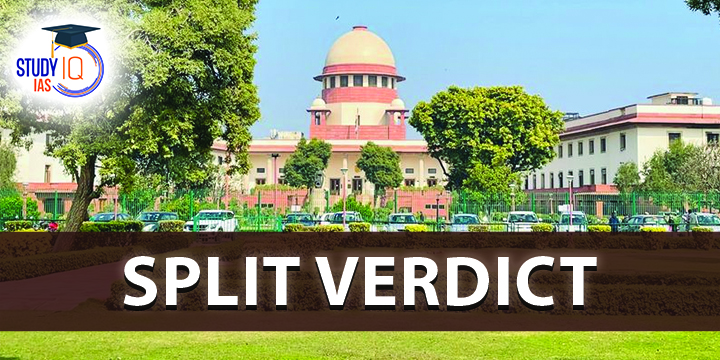Table of Contents
Split Verdict Meaning
- A Split Verdict is delivered when the Bench cannot decide a case, either by a unanimous decision or by a majority verdict.
- Split Verdict are possible only when the Bench has an even number of judges.
- This is the main reason why judges usually sit in Benches of odd numbers (three, five, seven, etc.) for important cases.
- Post-split verdicts:
- In case of a split verdict, the case is referred to a larger bench. The larger Bench can either be a three-judge Bench of the High Court, or an appeal can be placed before the Supreme Court for a larger bench.

- Previous instances of a Split Verdict:
- A two-judge Bench of the Delhi High Court had delivered a split verdict in a petition challenging the exception provided to marital rape in the Indian Penal Code (IPC).
- Another example of split verdict was the Madras High Court Division Bench order on the challenge to the disqualification of AIADMK MLAs owing allegiance to TTV Dinakaran (2018).
The Split Verdict Hijab Ban
- In the hijab ban case, one of the two judges on the Bench upheld the order of the Karnataka High Court validating the government’s ban, and the other set aside the High Court ruling.
- The judge, who set aside the High Court ruling, cited the Bijoe Emmanuel case while delivering the judgment.
- The matter has been placed before the CJI, who is expected to constitute a larger bench to hear the case.
Bijoe Emmanuel Case (1986):
- The petitioners in Bijoe Emmanuel & Ors vs State Of Kerala & Ors case had argued that for Jehovah’s Witnesses (a religious group), only Jehovah should be worshiped.
- The faith of the petitioner’s children, belonging to the Jehovah’s Witnesses, did not allow them to sing National anthem and they were wrongly suspended from school.
- The Supreme Court gave protection to the petitioner’s three children. The court said that forcing the children to sing the anthem violated their fundamental right to religion.
- The court also made remarks on freedom of speech and expression and the right to practice and propagate one’s religion.
- The court further added that our tradition teaches tolerance; our philosophy preaches tolerance; our constitution practices tolerance. It was necessary that rights of the petitioner were to be protected.
Freedom of Religion
This case invokes the Freedom of Religion, provided by the Constitution of India. So, let is discuss Freedom of religion:
- Right to freedom of religion is a fundamental right enshrined in the constitution to not only individuals but also religious groups in India.
- However, these freedoms are subject to public order, health, and morality.
- Article 25 (Freedom of conscience and free profession, practice, and propagation of religion):
- It guarantees the freedom of conscience, the freedom to profess, practice, and propagate religion to all citizens.
- Article 26 (Freedom to manage religious affairs):
- Every religious denomination has the rights such as:
- The right to form and maintain religious and charitable institutions.
- The right to manage its own religious affairs.
- The right to acquire the immovable and movable property.
- The right to administer properties according to the law.
- Article 27 (Freedom against payment of taxes for promotion of any particular religion)
- It prohibits states from imposing taxes for the promotion and/or maintenance of any particular religion/religious denomination.
- Article 28 (Freedom against attendance at religious instruction or religious worship in certain educational institutions):
- No religious instructions are allowed to be given in any educational institution wholly maintained out of State funds.
- Educational institutions administered by the State but set up under any endowment or trust mandating religious instruction shall be exempt from the above clause.
- Educational institution recognized by the State or receiving State aid shall not force an individual to participate in any religious activity.
Stats IQ
Impact of MGNREGA during the COVID-19 pandemic
Context: The Centre for Sustainable Employment, Azim Premji University has conducted a study titled “Employment guarantee during COVID-19 — The Role of MGNREGA in the year after the 2020 lockdown”
Important Finding of The Study
- The wages earned under the Act helped compensating somewhere between 20% and 80% of the income loss incurred because of the lockdown.
- Around 39% of all job card-holding households interested in working under the MGNREGA did not get a single day of work in the COVID year of 2020-21.
- The study pointed out that the MGNREGA was unable to meet with the actual demand from the ground.
- As per the study, if all the “unmet demand” must be fulfilled the NREGA wage bill should be increased at least three times.


 Unlocking the Potential of India–Afric...
Unlocking the Potential of India–Afric...
 Southern Ocean Carbon Anomaly: Why the W...
Southern Ocean Carbon Anomaly: Why the W...
 Speedy Justice and the Crisis in Consume...
Speedy Justice and the Crisis in Consume...

























